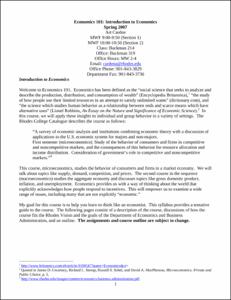Please use this identifier to cite or link to this item:
http://hdl.handle.net/10267/3398Full metadata record
| DC Field | Value | Language |
|---|---|---|
| dc.contributor.author | Carden, Art | - |
| dc.date.accessioned | 2009-02-17T17:10:33Z | - |
| dc.date.available | 2009-02-17T17:10:33Z | - |
| dc.date.issued | 2007-01-10 | - |
| dc.identifier.uri | http://hdl.handle.net/10267/3398 | - |
| dc.description | This syllabus was submitted to the Rhodes College Office of Academic Affairs by the course instructor. | en_US |
| dc.description.abstract | Welcome to Economics 101. Economics has been defined as the “social science that seeks to analyze and describe the production, distribution, and consumption of wealth” (Encyclopedia Britannica),1 “the study of how people use their limited resources in an attempt to satisfy unlimited wants” (dictionary.com), and “the science which studies human behavior as a relationship between ends and scarce means which have alternative uses” (Lionel Robbins, An Essay on the Nature and Significance of Economic Science).2 In this course, we will apply these insights to individual and group behavior in a variety of settings. The Rhodes College Catalogue describes the course as follows: “A survey of economic analysis and institutions combining economic theory with a discussion of applications to the U.S. economic system for majors and non-majors. First semester (microeconomics): Study of the behavior of consumers and firms in competitive and noncompetitive markets, and the consequences of this behavior for resource allocation and income distribution. Consideration of government’s role in competitive and noncompetitive markets.”3 This course, microeconomics, studies the behavior of consumers and firms in a market economy. We will talk about topics like supply, demand, competition, and prices. The second course in the sequence (macroeconomics) studies the aggregate economy and discusses topics like gross domestic product, inflation, and unemployment. Economics provides us with a way of thinking about the world that explicitly acknowledges how people respond to incentives. This will empower us to examine a wide range of issues, including many that are not explicitly “economic.” My goal for this course is to help you learn to think like an economist. This syllabus provides a tentative guide to the course. The following pages consist of a description of the course, discussions of how the course fits the Rhodes Vision and the goals of the Department of Economics and Business Administration, and an outline. The assignments and course outline are subject to change. | en_US |
| dc.language.iso | en_US | en_US |
| dc.publisher | Memphis, Tenn. : Rhodes College | en_US |
| dc.relation.ispartofseries | CRN Syllabi | - |
| dc.relation.ispartofseries | 27500 | - |
| dc.rights | Rhodes College owns the rights to the digital objects in this collection. Objects are made available for educational use only and may not be used for any non-educational or commercial purpose. Approved educational uses include private research and scholarship, teaching, and student projects. For additional information please contact archives@rhodes.edu. Fees may apply. | - |
| dc.subject | Syllabus | en_US |
| dc.subject | Curriculum | en_US |
| dc.subject | Academic departments | en_US |
| dc.subject | Text | en_US |
| dc.subject | Academic departments | en_US |
| dc.subject | Text | en_US |
| dc.subject | Economics, Department of | en_US |
| dc.subject | 2007 Spring | en_US |
| dc.title | ECON 101-01, Introduction to Economics, Spring 2007 | en_US |
| dc.type | Syllabus | en_US |
| Appears in Collections: | Course Syllabi | |
Files in This Item:
| File | Description | Size | Format | |
|---|---|---|---|---|
| 2007_spring_ECON_101-01_27500.pdf | 59.7 kB | Adobe PDF |  View/Open |
Items in DSpace are protected by copyright, with all rights reserved, unless otherwise indicated.